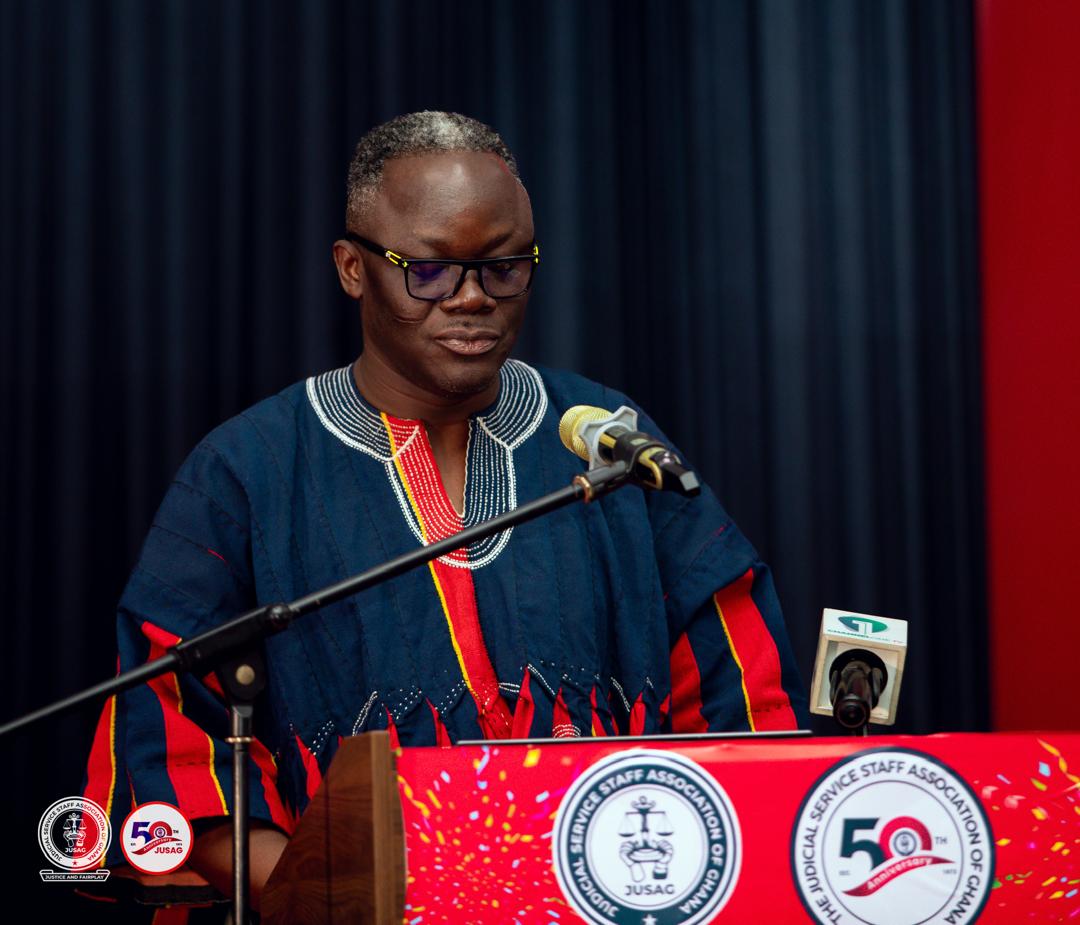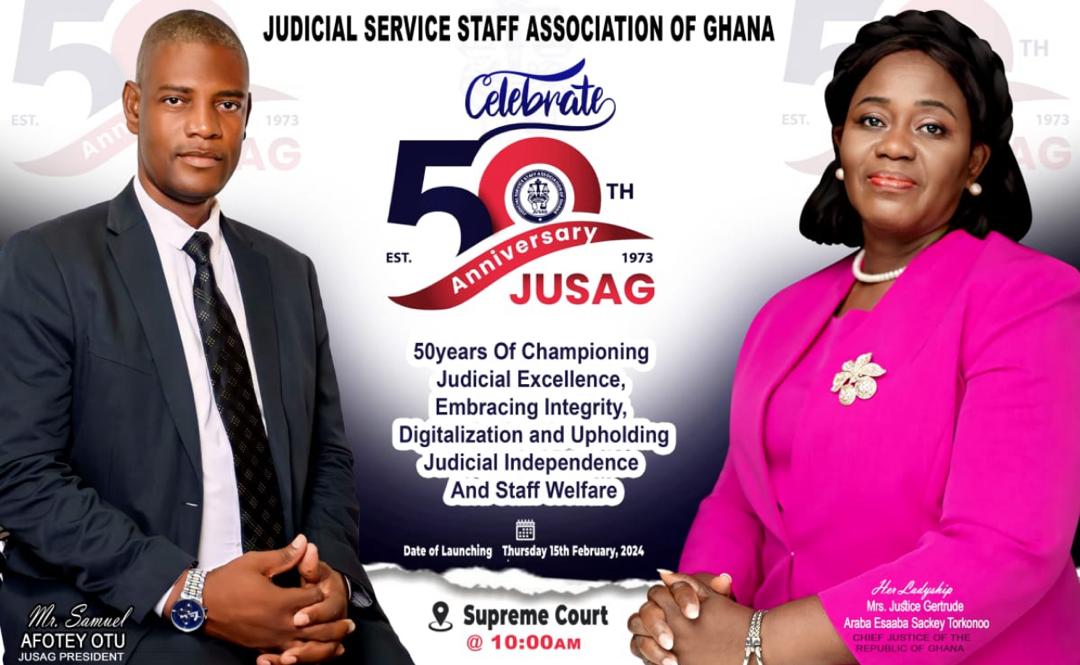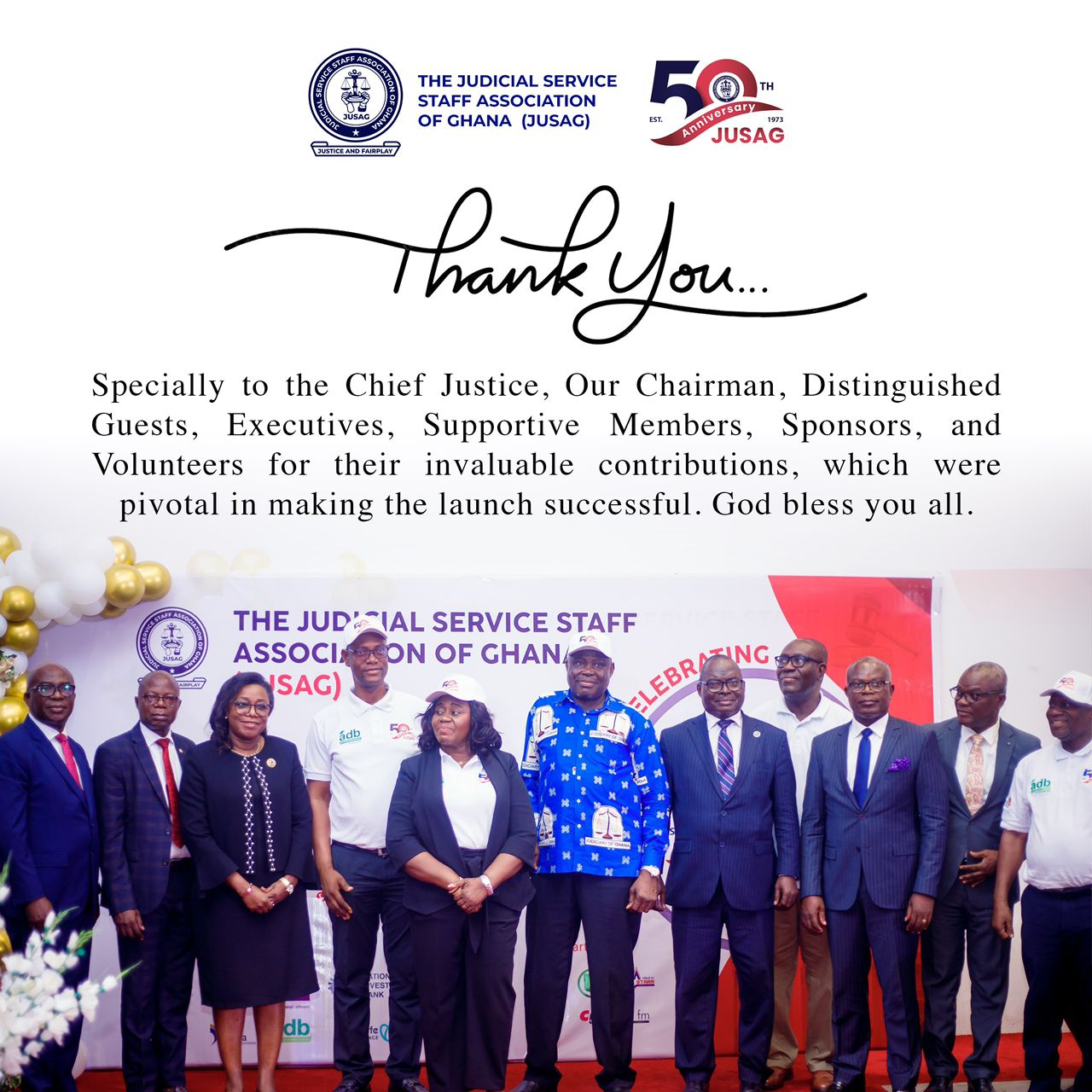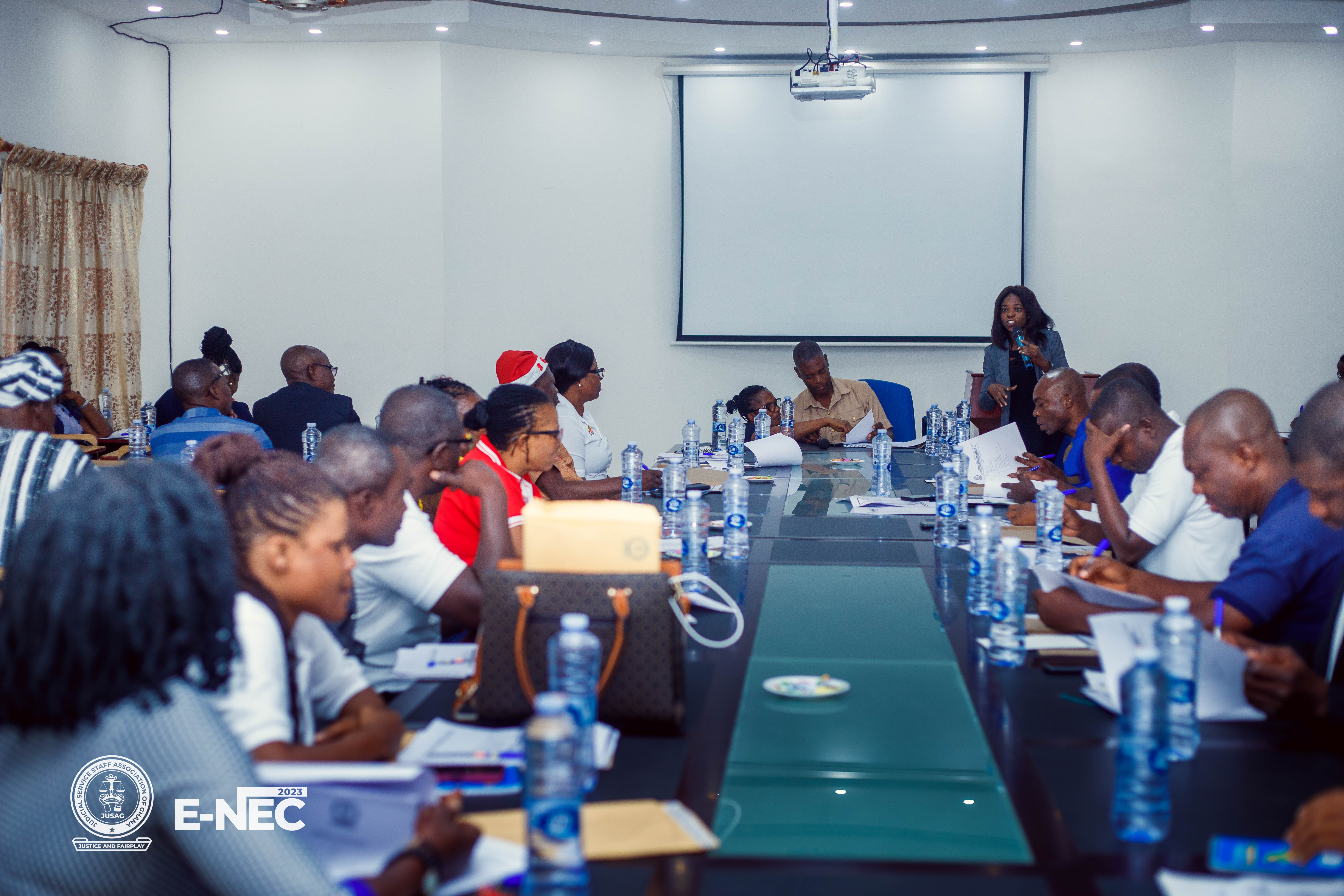JUSAG News Stories

Guest Speaker Samson Lardy Anyenini’s Address At JUSAG 50th Anniversary Symposium
JUDICIAL SERVICE STAFF ASSOCIATION OF GHANA (JUSAG) 50TH
ANNIVERSARY & SYMPOSIUM AT UCC ON 21ST SEPTEMBER 2024
GUEST SPEAKER’S SPEECH - SAMSON LARDY ANYENINI
Prof. Samuel Ato Duncan – Chairman
H.E. the President Nana Addo-Dankwa A.A
Her Ladyship the Chief Justice G.A.E.S.T
…
INTRODUCTION
LEADing Justice is certainly a great branding mantra. But it must not merely be easy on the lips of judges and court workers for brand effect. It is strategic and purposed to carry expectations of leadership in quality justice delivery by the courts for the people. So, it must also be on the frontages of the minds of citizens generally and to be shared by others the world over.
Let me re-state at the outset that it fails in its strategic goal until it sets all of us in earnest expectation of a judiciary that delivers justice that is trusted to meet the test and quality of the often quoted 1924 dictum of the Chief Justice of England, Lord Hewart in Rex vrs. Sussex Justices, ex parte McCarthy that “[j]ustice must not only be done, but must also be seen to be done”. And we cherish the rendition that “it must be manifestly and undoubtedly be seen to be done”.
ACTUATING THE ANNIVERSARY THEME
Your anniversary theme, “50 years of championing judicial excellence, embracing integrity, digitalization and upholding judicial independence and staff welfare” is a mouthful but most appropriate at this time. It aligns with Her Ladyship the Chief
Justice’s vision – LEADing Justice, where the acronym LEAD is
Law, Ethics, Assets, Due Process and Digitalization.
I have reflected and imagined the quality of justice delivery when this vision is fully realized. I didn't say 'if but 'when' it is realized because it non-negotiable in out fastmoving world. If the judiciary must stay relevant as that critical institution that thrives on trust, a vision to go fully digital is not only the path to survival, but excellence in the new order of an open society.
It is a vision, that was in a rare but most commendable first ever act, shared with citizens and the world through a media broadcast by the Chief Justice.
The state must commit to fund this project. The service, with the benefit of the lessons of the Fast Track Court experiment, must find creative means to mobilize resources to make it a reality in good time. (briefly illustrate with CJ’s story about how she asked for
digitalization facilities and a got a bill that sacred her)
OPACITY ENDANGERS DEMOCRACY
The African Charter on Human and Peoples Rights (ACHPR) enjoins state parties to promote open governance by enacting Access to Information laws. This is commanded by article 21 of the 1992 constitution, but took Ghana two decades of sustained advocacy to birth the RTI law in 2019. I am proud to have been in the front role of the civil society pressure for its passage.
In a recent paper I observed that governments that are not embracing of an open society “are fast realizing that they endanger democracy by not guaranteeing the one most basic right to citizens. Afrobarometer surveys overtime have not only confirmed the erosion of faith in democratic structures as citizens complain of not seeing the dividends, but these surveys have predicted accountability movements such as faced by the Government of Kenya. The 2024 Afrobarometer titled African insights 2024: Democracy at risk – the people’s perspective, discloses how “[m]ore than half of Africans (53% across 39 countries) are willing to accept a military takeover if elected leaders “abuse power for their own ends.” It highlights receding confidence as it reechoes the caution that governance cannot continue with the ‘business as usual’ attitude. Undoubtedly, the recent wave in resurgence of military takeovers is partly blamable on lack of transparent and open governance.
In their paper Christopher Nyinevi & Richard Fosu (2023): The African Union’s
Prohibition of Unconstitutional Changes of Government: An Uneasy Choice between
Fidelity to Principle and Pragmatism, the researchers at the Monash University, Australia, give a reminder about the autocratic regimes from which Africa begun its democracy project. They note that a major factor that drove the “period of Africa’s political and socioeconomic stagnation was the lack of strong systems of democratic participation and peaceful transfers of power.”
Leadership that was opaque and the lack of inclusive governance compelled resort to destabilizing revolutionary takeovers and countercoups that saw as many as three hundred and twenty-seven (327) coup d’états within a space of forty-five years (1956 – 2001) in Sub-Saharan Africa alone, although only eighty (80) of those coups were successfully executed.”
A life of integrity is not lived in opacity. Justice emanates from the people but is administered on their behalf by an independent judiciary, declares article 125 of the Constitution. Integrity is the anchor of this independence as promoted by openness and that is the most potent democratic tool to engender inclusive, participatory and accountable governance to avoid a return to Africa’s the ugly past.
SPEED AND PREDICTABILITY OF JUDICIAL OUTCOMES BIRTH TRUST
The theme for your symposium is “[j]udicial independence and integrity; critical ingredients for peaceful election 2024.” It is a statement, not a question. I have simply been expressing support it. That’s how easy you have made my job as your guest speaker.
Speed and predictability judicial outcomes are key ingredients for judicial independence. I am certainly not talking about speed induced by prejudice or some improper considerations. I am certainly not talking about the public’s ability to predict the outcome of a case because of suspicion over such similar considerations not borne out of the facts or law for determining a case. In years of practice, I have experience enough to know there are judges who allowed themselves to be influenced by improper considerations. My view, which is public knowledge, is that they are few, and undeserving of the calling. They tarnish the otherwise ‘sacred’ institution, and are a danger to society.
Speed and predictability are critically needed to engender TRUST for peaceful elections. If a party lives with the assurance that they will receive justice from the courts, they will be prone to avoiding extra-judicial conduct that threatens peaceful elections. Their natural default thinking would be that they would resort to the courts if wronged in the elections. I will not approve of a complaint of lack of trust in the judiciary to justify recourse and resort to unlawful, unconstitutional or destructive and violent means to resolving concerns with the electoral process.
Our 4th Republic has been the most enduring and we look to its 32nd anniversary on January 7 2025 when the 9th Parliament is constituted and a new President is sworn into office. We are indeed an oasis of peace surrounded by turbulence.
Political power has alternated between the largest opposition National Democratic Congress (NDC) and the governing New Patriotic Party (NPP). Our elections are secured by law and due process as upheld by the judiciary.
The NDC is presently demanding a forensic audit of the electoral roll because it has uncovered wrongs including illegal and criminal voter transfers. These transfers were done on the blindside of the voters concerned contrary to law. This is a criminal enterprise to disenfranchise those innocent voters on election day. The Electoral Commission has indicted its District Director for the conduct. But it has declined the request for an independent audit over further claims of widespread irregularities including illegal transfer of over two hundred and forty thousand voters. It insists it has fixed some of the complaints by the NDC and that it is capable of resolving similar complaints under the voter-register exhibition window. The NDC disagrees and this is what led to mass nationwide demonstrations on Tuesday with threats of further public manifestations.
The NPP threatens a counter demonstration if the EC accedes to the request for forensic audit. (make brief remarks about this laughable conduct). The issues are easily resolvable at law. But why is the NDC reluctant to approach the court? The NPP had similar concerns and demanded a fresh voters’ register ahead of the 2016 elections. They did not supply as much evidence but they had a genuine complaint and I advocated for them to the chagrin of the NDC which saw nothing wrong at the time and defended the EC the way the NPP does today. In fact, some kept describing me as lawyer for the NPP when the NPP, like the NDC today, had not taken their particular grievance to the court.
These partisans have such deep mistrust for the courts when they are not in Government. Their premise may be faulty, and the hard evidence in respect of the court’s fidelity to the law may prove same for the small, but important number of cases they rely on to project the court as overly biased against them in such times.
Elections are about the voters and not the EC. What does the EC lose in granting a request that could improve its own credibility badly affected by certain appointments that got civil society demanding a reversal of the decision by the President. The EC thrives on public trust. The anchor-ethos of the Constitution including its preamble, articles 1 and 296 confirm the scripture that admonishes avoidance of the appearance of evil. Appointing politically exposed persons particularly a dire in the wool party footsoldier like Dr. Peter Appiahene goes against the grain. It does such damage to the reputation of the EC and may be said to negate the Constitution.
(briefly comment on conduct of the EC that has cost the taxpayer and how the Supreme Court has consistently upheld the right to vote even of a single person including prisoners and injuncting District Assembly elections at the last hour – Eyi Mensah case)
CONCLUSION – RULES FOR SPEEDY RESOLUTION OF ELECTION DISPUTES
Everything must be done to bring the needed speed and predictability to get resort and recourse to the courts to be a natural default action by citizens generally and political parties in particular.
The recent Afrobarometer survey carries concerning news for critical public institutions like the EC and the Judiciary. The EC that enjoyed 75% trust in 2005 now manages only 33% public trust. There has been an erosion in the trust enjoyed by the judiciary from a high of 65% in 2005 to 36% in 2022.
The noble pursuit of the Chief Justice to turn things around will not succeed without you the staff. How long does it take, normally, to get results when I file a search or request record of proceeding at the Registry of the Court? I will not enumerate what you already know you ought to do since a good measure of what erodes trust in the court comes from your interaction with court users and the general public.
The Chief Justice got civil society rejoicing when she announced at the just-ended Bar Conference in Kumasi that the Rules of Court Committee is working on dedicated rules for parliamentary election disputes. Good news! In a recent CDD survey, an overwhelming 98.4% of Ghanaians who have ever participated in a parliamentary election litigation as parties, lawyers, judges and observers want the rules of court amended to speed up the time it takes for resolution of parliamentary election disputes.
Over 40% of 53 of respondents of a CDD survey want such disputes to be resolved within 30 days, and a whopping 63.3% of the 61 carefully selected respondents desire that if such cases proceed to final appeal, the Court of Appeal should dispense with such appeals also within 30 days.
The average turnaround time for determining such disputes in Ghana is more than one year while the courts in Kenya and England are likely to dispense with such cases in 6 months and 7 months averagely respectively. It is doable because courts in Ghana have on occasions resolved such cases within 30 days. I did one such case (Kwesimintim) ahead of the 2016 elections and the trial was concluded within two weeks. I just finished one other (Walewale) for which trial concluded within same period.
(Walewale NPP Primary Case – Judge reserved reasoned judgment to 12th September 2024 but that promised has not been kept as judgment is still not ready. This may affirm suspicions of bias (a hatchet job) raised by the 1st Defendant and his followers to erode trust in the system real or imagined)
The rules of court in Kenya, for instance, make time-limits to secure expeditious resolution of such disputes a matter of law rather than discretion. In Ghana, the rules (i.e. Supreme Court (Amendment) Rules, 2012 (C.I. 74)) have recently been amended (i.e. SupremeCourt (Amendment) No.2 Rules, 2016 (C.I.99)) to try presidential election petitions within 42 days. By the Kenyan Constitution, a presidential election petition must terminate in a period of 14 days after it has been filed in the Supreme Court. I had the privileged of leading the process towards C.I.99 as the consultant for the Judicial Service of Ghana.
You, members of JUSAG, have a significant role to play in actualizing the themes for your 5th anniversary and symposium beyond the 2024 elections.
Thank you for the opportunity to address you.
END




